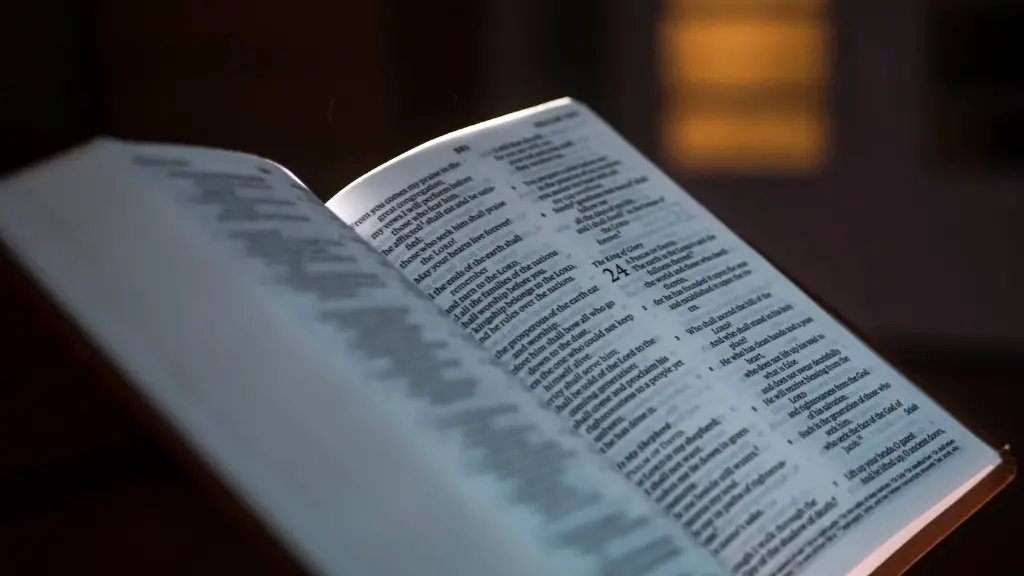Was The Book Of Enoch In The Bible?
The Book of Enoch has long been a topic of curiosity. It is mentioned in the Bible and its contents have been preserved by Judeo-Christian scholars for millennia – yet, there is much debate about whether or not this ancient text actually belonged in the Bible. In order to understand the debate around this book, it is important to first understand the history of the Book of Enoch, what its contents are, and the possible implications of its inclusion or exclusion in the Bible.
The Book of Enoch began life as an early composition composed before the Maccabean period, around 250 BCE and contains a wealth of knowledge about Jewish angelology, demonology, and astronomy. It was composed in five sections with the first four sections further divided into five “books.” This first section of the book describes the fall of the angels and their imprisonment in the underworld by God after they refused to stay in heaven. The second section discusses the birth of Noah, the Flood, and the Tower of Babylon. The third section is a description of the rewards and punishments given by God to different kinds of sinners. The fourth section tells of a journey to heaven by Enoch and his journey through the heavens and his return to earth. The fifth section contains a collection of strange and bizarre visions of the future and revelations about the fate of humanity.
The main debate about whether or not the Book of Enoch was part of the Bible comes from the fact that it is not found in any of the collections of books that eventually became the modern Bible. Some scholars suggest that the Book of Enoch was originally included at some point, but was later removed after it was deemed too controversial or heretical. Similarly, some believe that the book was lost due to textual corruption, while others believe that it was simply not included in the final editions of the Bible.
From a theological point of view, there is also a debate about the authenticity of the book, with some arguing that the book is a legitimate prophecy of God’s plan for mankind, while others contend that it is merely a set of myths. Many theologians argue that the fact that the Book of Enoch is not in the Bible refers to the fact that those who composed the Bible, believed that the book was not authentic or inspired by God. Ultimately, the decision of whether or not a book is included in the Bible is based on the opinion of its current stewards, rather than on any specific facts about its origins.
Although much about the book’s origin remains unknown, its popularity as a source of knowledge has endured throughout the centuries. It is believed that some of the ideas in the Book of Enoch have influenced other religious texts and traditions, including the Dead Sea Scrolls, and the New Testament. Additionally, the book has been quoted by some of the most influential religious figures in history, including Augustine of Hippo and John Calvin.
For these reasons, the debate over whether or not the Book of Enoch was in the Bible is likely to continue for some time. Meanwhile, it is important to note that the book is still widely studied and respected today, and its message of redemption, after living a life of rebellion against God, resonates with individuals across all beliefs and cultures.
Broadening of the Spectrum
The debate about the inclusion or exclusion of the Book of Enoch from the modern Bible has become more complex in recent times. This is due to the broader range of interpretations and ideas that are now being considered. The idea of ‘inspiration’ has been revised, and many now accept that other religious texts of ancient times may have been inspired by the divine. Furthermore, the book of Enoch has become subject of popular culture, and is often referenced in popular films, video games, and books.
At the same time, modern Bible scholars have taken a more critical look at the texts that make up the Bible, and the idea of divine inspiration has been questioned in some circles. This has led to some scholars suggesting that the book of Enoch may have been excluded due to its controversial nature. Such questions may never be resolved definitively, however, they do make us reconsider the role of theology and the complexity of our beliefs.
A further complication that arises from the debate is the relationship between the Torah, the Septuagint, and the Bible. The Septuagint is a collection of Greek books that were used to form the basis for the modern Bible, however, it does not include the Book of Enoch. This leads some to argue that the book may not have ever been part of the Bible, as it did not form part of this crucial starting point.
In examining the debate surrounding the Book of Enoch, it is apparent that there are numerous facts and perspectives to take into account. In looking at the history, contents, and debates of this topic, it becomes clear that while there is much to consider, the definitive answer to whether or not the Book of Enoch was originally in the Bible is still unknown.
Implications Of The Debate
The debate about the inclusion or exclusion of the Book of Enoch has implications for both today’s believers as well as religious scholars. To believers, it serves as a reminder that writers and editors of religious texts can shape and inform the interpretation of scripture and its teachings. To scholars, it is a reminder that there are a wide range of complex issues that need to be examined in order to achieve a better understanding of a topic.
The debate also serves as a reminder that our beliefs and interpretations can be fluid. With such a range of opinions on this particular topic, it is important to remember that it is okay to question and disagree and still remain devoted to a faith or particular teachings.
The debate surrounding the Book of Enoch is also a reminder of the importance of understanding different cultures and beliefs. This book, which originated with the Jewish people and later came to be revered by Christian communities, is a reminder of the breadth of religious traditions throughout the ages. It is a reminder that we can learn a great deal from engaging in these debates and dialogue.
The debate surrounding the Book of Enoch is, at its core, a debate about the power of religious texts and the role that they have played throughout time. It serves as a reminder that despite all of the complexities, diversity, and changes, religion remains a source of hope, understanding, and connection.
Attitude to the Divine
The debate about whether or not the Book of Enoch was included in the Bible also serves as an important reminder of how people’s attitudes towards the divine have changed over time. This debate reflects humanity’s ever-evolving relationship with religion and the divine. As concepts and ideas change, so too do our views on religion, morality, and ethics. This debate is a testament to the fact that there are many interpretations of the same text and that beliefs can, and do, evolve over time.
The debate is also a reminder that as humans, we are constantly seeking to understand our relationship with the divine. This has been true since the beginning of time and remains true today. The debate over the inclusion or exclusion of the Book of Enoch is a reflection of this process of exploration and understanding.
The debate is also a reminder that we may never have a definitive answer to whether or not the Book of Enoch was part of the Bible. This has been true for centuries and will likely be true for centuries to come. It serves as an important reminder that despite all the complexities of life and our differing beliefs, we are all united in our shared attempt to understand our relationship with the divine.
Conclusion
The debate about whether or not the Book of Enoch was in the Bible has gone on for centuries, and it is unlikely that a definitive answer will be found any time soon. Despite this, it is important to remember that the debate is a reminder of the fluid and ever-evolving nature of belief, of the importance of learning from each other and engaging in dialogue, and of our shared attempt to understand our relationship with the divine.




